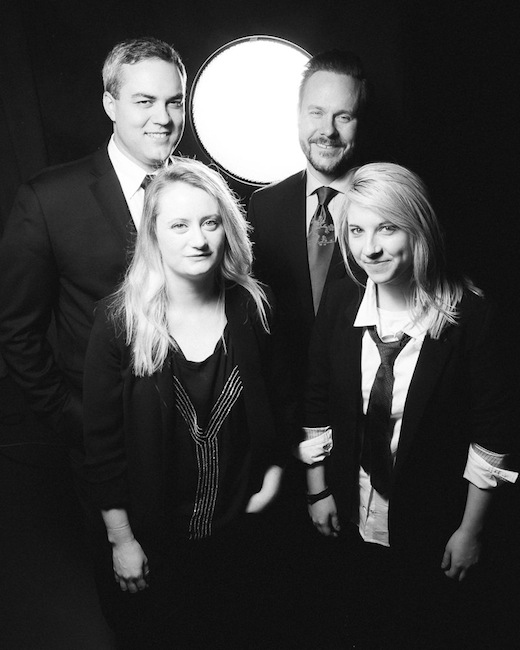Spektral Quartet packs the house for Schoenberg

Violist Doyle Armbrust looked out at the overflow crowd assembled for the Spektral Quartet’s concert Sunday afternoon in Hyde Park. “And they say Schoenberg doesn’t sell,” he said.
The Spektral Quartet managed to pack the intimate Fulton Recital Hall at the University of Chicago for the opening program in its season-long series devoted to Arnold Schoenberg. With the Moody Blues-esque title, “In Search of Futures Past,” the concerts will offer Schoenberg’s complete string quartets, presenting each work alongside composers that either exerted an influence on Schoenberg or were influenced by him.
Sunday’s program coupled Schoenberg’s String Quartet No. 1 with Brahms’ first published work in the genre, his String Quartet in C minor, Op. 51, No. 1.
Johannes Brahms and Arnold Schoenberg would at first glance appear to be antipodal opposites of classical music: Brahms, the musical conservative who drew on existing forms and Schoenberg, the revolutionary whose 12-tone system spelled an effective end–or at least extended pause–to Romanticism.
Yet Brahms was neither as retrograde as his Wagnerite detractors would have it, nor was Schoenberg always the idol-smashing musical iconoclast. Schoenberg himself noted his predecessor’s originality and forward-looking qualities in a celebrated article, “Brahms, the Progressive.” And no composer casts a stronger shadow over Schoenberg’s music than Brahms.
Written in 1905, Schoenberg’s Quartet No. 1 is a huge work, cast in a single movement of 45 minutes. This restless, surging score–analogous in some ways to Verklarte Nacht–is still largely outwardly traditional in style. Yet Schoenberg’s jumpy, mercurial qualities can make Mahler seem like Arvo Pärt. The constantly morphing music is like unmoored Late Romanticism glimpsed in a fun-house mirror, with broken, distorted shards of Brahms, Schubert and Wagner flashing past.
Schoenberg’s turn toward his 12-tone method makes more sense when you see the dead end of his own brand of chaotic Romanticism. The composer clearly needed some self-imposed artistic boundary-drawing and a more structured template for his musical ideas.
The beauty of Spektral Quartet’s impassioned performance was that it served both sides of Schoenberg’s music so well. As led by the group’s superb first violinist Clara Lyon–who also wrote the perceptive program notes–the players were fully in synch with the rhapsodic lyrical flights.
Yet the musicians also conveyed the sense that the breakdown of tonality is right around the corner—in the fin de siecle decadence of the waltz fragment played by Lyon and Armbrust about ten minutes in; the buzzing high harmonics that seem to anticipate Ligeti; and the unsettled repose of the penultimate Langsame Viertel section.
Spektral Quartet gave the belated Chicago premiere of Morton Feldman’s six-hour String Quartet No. 2 last March, so Schoenberg’s unbroken three-quarter-hour work is a comparative bagatelle.
Still, this is an epic, hugely challenging score and Spektral put it across with bristling fire and conviction. The communicative playing kept the music moving forward, naturally leading one on to the next episode. The final section was joyous in its bumptious high spirits, and, with an artful deceleration, they conveyed the spare, quiet solace of the coda, beautifully played by all.
The Spektral musicians were equally eloquent advocates for Brahms’ Quartet in C minor on the first half.
Spektral’s lean, acutely focused sonority is well suited to this tautly dramatic music and they were especially fine at bringing out the restless urgency of the outer movements. The Romanze is cast in Brahms’ familiar vein of nostalgic introspection with even a greater shade of melancholy than usual. The musicians charted the ebb and flow naturally, Lyon’s open-hearted violin lending ample expressive feeling without ever turning soupy. The ensuing Allegretto continues the pathetique vein rather than being a light-hearted scherzo, and the players conveyed the lyricism as well as the pastoral unease, with a nicely contrasted rustic quality in the trio.
I’d still like second violinist Maeve Feinberg–Spektral’s newest member–to play out with greater projection at times to balance the four voices more equally. But this was strongly argued Brahms by any measure and made a fine prelude to the Schoenberg.
An auspicious start to an enterprising series that will likely prove a highlight of the current music season.
Spektral Quartet’s Schoenberg series continues with Schoenberg’s String Quartet No. 2, Bartok’s String Quartet No. 1 and Webern’s Langsamer Satz. Concert time is 7:30 p.m. February 10 at Fulton Recital Hall. spektralquartet.com
Posted in Performances




